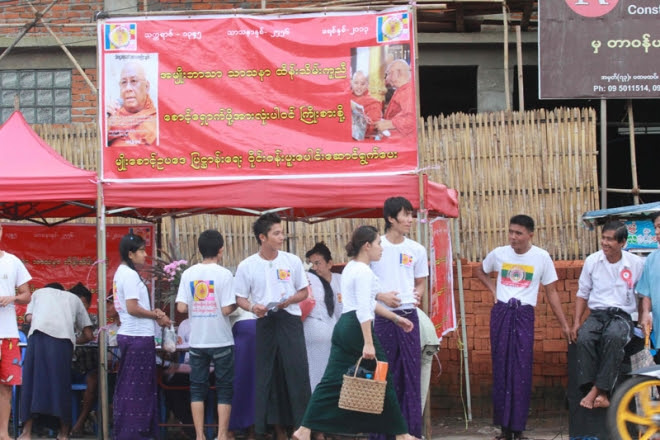Drafting an Interfaith Marriage Law would be a “disgraceful act that would invite international ridicule” of Myanmar, says a statement endorsed by almost 100 women’s organisations and ethnic, religious and civil society groups.
The statement says arguments against interfaith marriage are aimed at causing a distraction before the elections due in 2015, are delaying the momentum of a transition to democracy and are an obstacle to achieving national peace and amendments to the constitution.

It calls for amendments to the constitution and for the national peace process to be given immediate priority over the proposed interfaith marriage law, which it describes as “highly contentious” and likely to creative unnecessary negative outcomes. The State is urged to instead work towards a law requiring the compulsory registration of all marriages, regardless of race, religion and sex.
The statement “strongly rejects” President U Thein Sein’s efforts to draft an Interfaith Marriage Act because “the proposed law is based on discriminatory beliefs that women are generally physically and mentally weaker than men, and therefore need to be supervised and protected”. Such beliefs deny women the inherent rights of freedom of survival and freedom of choice, says the statement, released on May 5.
Noting that Article 364 of the Constitution stipulates that the abuse of religion for political purposes is forbidden, the statement urges awareness that the proposed Interfaith Marriage Act “could be used by some for political gain at the 2015 election, and because of potential unwanted consequences, great political caution should be taken”.
The statement warns that faith-based extremist nationalism can destroy peace and incite conflict and rejects all political violence that causes physical and mental insecurity among the people.
It acknowledges the religious and ethnic differences among the nationals of Myanmar and cautions that “developing initiatives based on religion hinders the implementation of national solidarity and current peace building processes”.
The groups pledge to “strive and endeavour in every non-violent way possible, to amend laws and regulations, including the Constitution, that discriminate against women, including the involvement of women in the political sphere.”
The May 5 statement is based on a document released by women’s groups on June 16 last year, to which more recommendations have been added.
The statement, which lists 11 points of concern and includes seven suggestions for consideration and implementation, was endorsed by 97 groups across the gender, ethnic, religious and civil society spectrum.
They include Akhaya, the Sawm Rawm Women Peace Builder Team, Ninu, Women for Justice, the Political Group outside Parliament, the Saytanar Shin Thway Luu Shin Association, Kings and Queens, the Rattana Metta Organisation, Equality Myanmar, Student Christian Movement, the Agriculture and Farmer Federation of Myanmar – Lutputta and the Thinking Classroom Foundation.
The first of the 11 points of concern states: “We believe that current faith-based political activities, including the arguments against interfaith marriage currently taking place in the country, are not in accordance with the objectives of the peaceful coexistence of all faiths and the prevention of extreme violence and conflict, but are instead events and ideas designed to distract the public for the 2015 election.”
“We view these events as delaying the momentum of transition to democracy , and as a hindrance to national peace processes and the constitutional amendments desired by Myanmar’s people,” the statement says.
It says elements of the proposed law that place restrictions on women’s equality and freedom do not meet international human rights standards and do not comply with the Convention to Eliminate All Forms of Discrimination against Women (CEDAW), to which the government acceded in 1997.
“Rule of law and access to justice are the most effective measures to protect and provide security for women,” it says, calling for urgent action against those who use violence towards women.
The proposed Interfaith Marriage Act, the statement says, “not only discriminates against Myanmar Buddhist women, women of other faiths residing in Myanmar, and indigenous people, but also places the responsibility of preserving race, religion, culture and traditions solely on women.”
It says the drafting of the act, “for the reason of preserving race, religion, culture and traditions, does not respect and acknowledge the reasoning abilities of Myanmar Buddhist women to think rationally and make decisions, and instead restricts and obstructs their freedom of choice to make decisions on issues directly concerned with their lives”.
The statement says only when women are able to make decisions on their own that enable them to lead strong, healthy and successful lives “will the country realise genuine development”.
It calls for people, either men or women, to be raised in a way that nurtures them to value and respect heritage, religion, culture and traditions “rather than imposing the responsibility of preserving race, religion culture and traditions of a country entirely on women”.
The statement notes Myanmar’s transition to democracy has attracted international attention and support and warns that drafting laws which do not meet democratic ideals can damage the country’s image and dignity and hinder democracy building.
“Drafting the Interfaith Marriage Law, a law that directly discriminates against the inherent rights of women, at a time when the Government is submitting a report to [the] CEDAW committee in August 2014, would demonstrate the Government’s violation of both human rights and women’s rights and would be a disgraceful act that would invite international ridicule,” the statement says.



